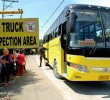DAVAO CITY – The Center for Trade Union and Human Rights (CTUHR) believe that living wage and regular jobs will help the urban poor as the country face high vulnerability to climate change.
CTUHR cited the climate change vulnerability index showing the Philippines as among the top 10 countries at extreme risk to climate change. The index also showed Metro Manila is second to Bangkok as the most vulnerable city to climate-change related disasters.
In its recently published study, CTUHR revealed urban poor women and their family members lost days of work thereby lowering family income during and after the calamities. The report also noted that because of the precariousness of livelihood and employment urban poor women have, it becomes almost impossible for families to recover from disasters.
The study, climate justice feminist participatory action research (CJ-FPAR) is part of multi-country research, initiated and supported by the Asia Pacific Forum on Women Law and Development (APWLD), a leading regional feminist network that has a consultative status at the United Nations.
Daisy Arago, CTUHR executive director said extreme weather events aggravated the urban poor’s condition.
“Combined with poverty wages and informal or contract employment, these disasters will keep the poor ever mired in poverty. Building resilience and adaptive capacity of the poor to climate change should therefore include providing living wages, regular jobs, more viable livelihood and social services to the poor,” Arago explained during a Solidarity Walk for climate justice held in Novaliches QC last Saturday (April 18).
The Solidarity Walk organized a recently formed local alliance, Kilusan ng Mamamayan para sa Hustisyang Pangklima (KMHP), comprised of women organizations, trade unions and church people, called for decent work, livelihood, and rights as part of a “just” adaptation policy to climate change.










